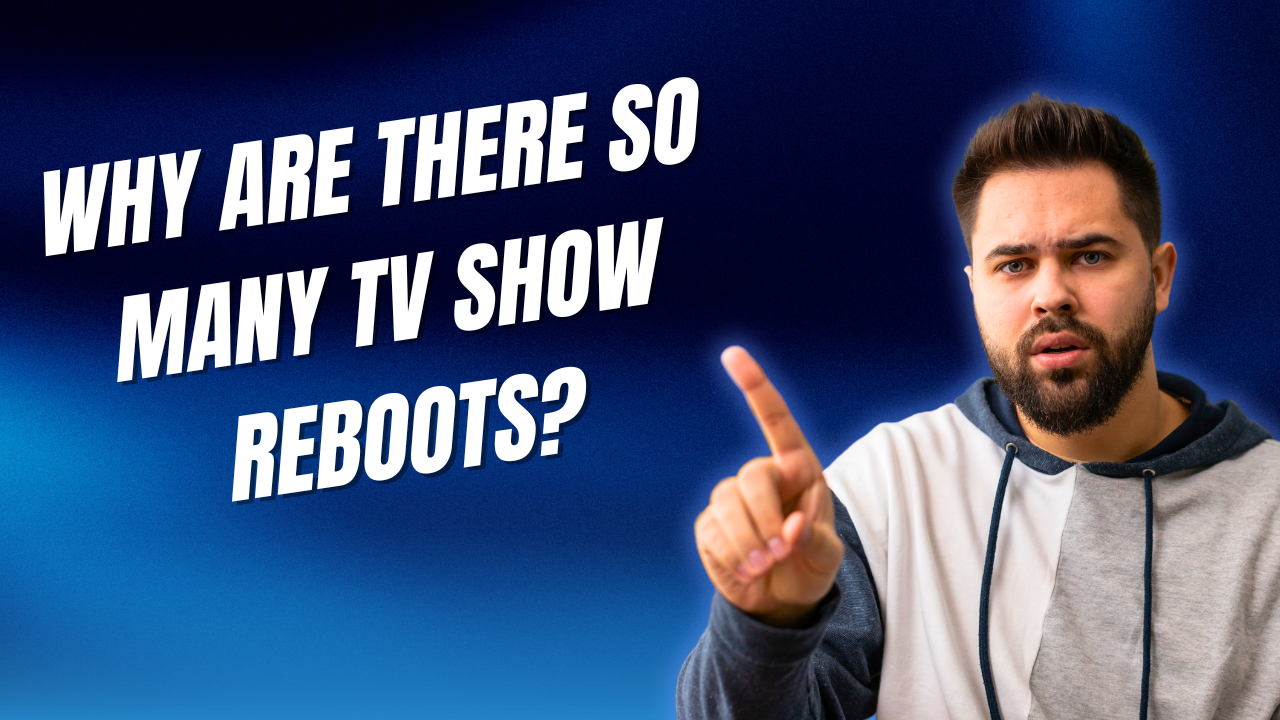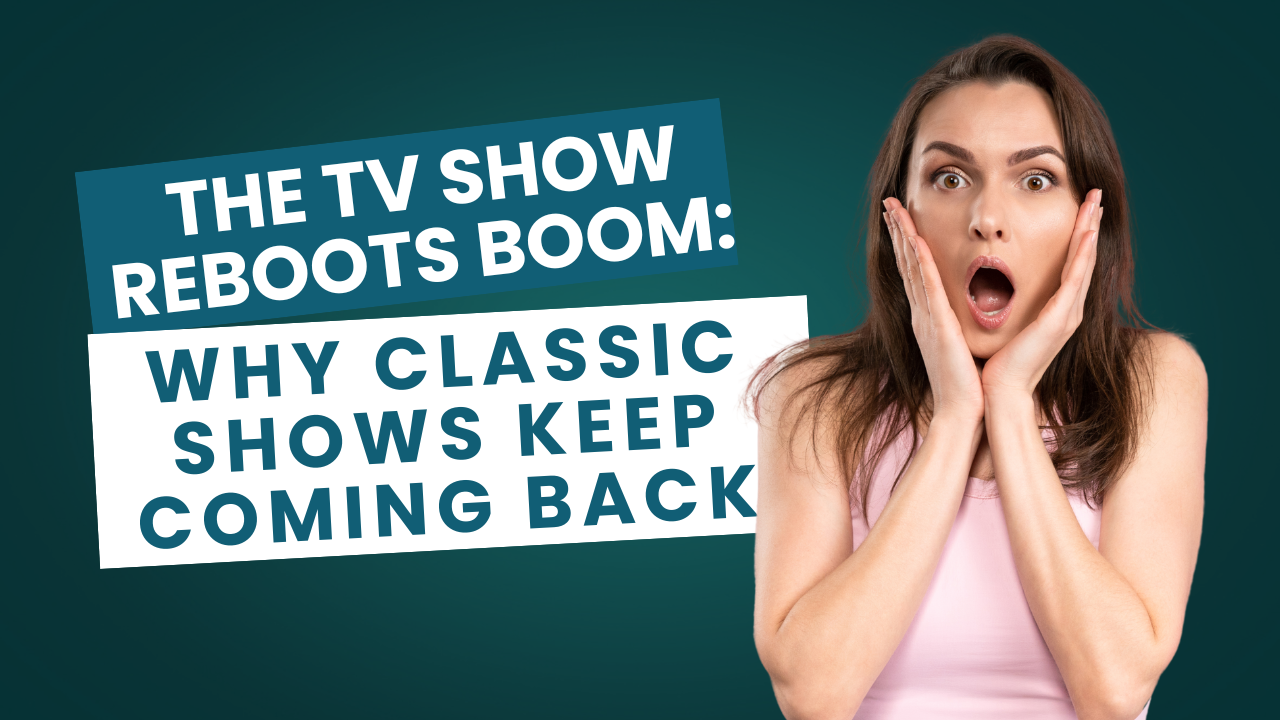Introduction: Welcome to the Reboot Era
Whether you’re scrolling through Netflix or tuning into HBO Max, one thing is clear—TV show reboots are everywhere. From Gilmore Girls: A Year in the Life to Bel-Air and And Just Like That…, Hollywood is betting big on nostalgia. But what’s fueling this reboot obsession?
Is it a smart business move, a lack of original ideas, or a little of both?
In this article, we’ll explore:
-
The financial and emotional reasons behind the reboot craze
-
Which TV reboots succeeded—and which flopped
-
How streaming platforms are reshaping TV storytelling
-
Whether reboots are a threat to originality in entertainment
Love them or hate them, TV show reboots are here to stay. Let’s explore why.

1. Why Are There So Many TV Show Reboots?
Nostalgia Sells—And Streaming Platforms Know It
Nostalgia is a goldmine. As Millennials and Gen Xers crave the shows they grew up with, streaming services like Netflix and Disney+ are eager to deliver.
📺 Case in Point: Fuller House (2016–2020) revived Full House with impressive viewership, despite mixed critical reviews.
📊 Data Insight: A Nielsen study revealed that 60% of viewers prefer watching familiar shows over new ones. Reboots give audiences comfort—and platforms a safe return on investment.
Built-In Audiences Reduce Risk
Original shows are a gamble. Reboots, on the other hand, come with name recognition and an existing fanbase.
✅ Hit Example: Cobra Kai took The Karate Kid legacy and turned it into one of Netflix’s biggest hits.
❌ Missed Mark: Heroes Reborn tried to recreate the original’s magic but stumbled due to poor writing.
Creative Safety Over Innovation
Hollywood’s obsession with known intellectual property (IP) reveals a deeper fear: originality doesn’t always sell.
🎬 Executive Insight: “It’s easier to pitch a familiar title than an unknown concept,” say insiders.
This leads to studios recycling the past instead of taking creative risks.
Reboots Offer a Chance to Fix the Past
Some modern reboots aim to update outdated narratives or expand representation.
🔁 Bel-Air reimagines The Fresh Prince as a dramatic exploration of race and privilege.
💪 She-Hulk brings feminist perspectives to the superhero genre.
These shows prove that reboots can evolve—not just repeat.
2. TV Reboot Winners and Losers: What Worked, What Didn’t
✅ Successful TV Show Reboots
| Reboot | Original | Why It Worked |
|---|---|---|
| Cobra Kai (2018–) | The Karate Kid (1984) | Balanced nostalgia with fresh, compelling arcs |
| Twin Peaks: The Return (2017) | Twin Peaks (1990–91) | Maintained the original’s surreal tone |
| Doctor Who (2005–) | Doctor Who (1963–89) | Modernized while respecting the original’s legacy |
❌ Failed TV Reboots
| Reboot | Original | Why It Flopped |
|---|---|---|
| Charlie’s Angels (2011) | Charlie’s Angels (1976–81) | Poor execution, lackluster casting |
| MacGyver (2016–21) | MacGyver (1985–92) | Failed to capture the charm of the original |
| Charmed (2018–22) | Charmed (1998–2006) | Fan backlash over drastic changes |
Key Takeaway:
The best TV show reboots respect their source material while offering new angles. The worst feel like soulless cash-ins.
3. How Streaming Services Fuel the TV Reboot Craze
Streaming = Safe Bet for Old IP
Netflix, HBO Max, Disney+, and Paramount+ are all investing in reboots for several reasons:
-
🔄 Subscriber retention: Familiar content keeps viewers subscribed longer
-
🤖 Algorithm success: Known titles outperform original ones in recommendations
-
🌍 Global reach: Beloved franchises often already have international fans
🎯 Examples:
-
The Proud Family: Louder and Prouder (Disney+) targets Millennial nostalgia
-
Lizzie McGuire was planned for revival to draw back 2000s kids
Binge-Worthy Nostalgia
Streaming also changes how we consume reboots. Instead of weekly episodes, full seasons drop at once.
📺 Gilmore Girls: A Year in the Life (2016) benefited from this model, satisfying fans in a single binge-worthy package.
Upcoming example: Avatar: The Last Airbender’s live-action remake (2024) is expected to follow this binge format.
4. Should Classic Shows Be Rebooted?
Why Some Say “Yes”
-
🌟 Introduces timeless stories to younger audiences (e.g., DuckTales 2017)
-
🔁 Updates old shows with modern values and visuals
-
🌀 Offers long-awaited closure to fans (Veronica Mars 2019 revival)
Why Others Say “No”
-
🚫 Signals a lack of creativity in Hollywood
-
😞 Risks damaging beloved franchises (The Muppets 2015)
-
💔 Nostalgia can’t make up for poor storytelling
When Reboots Actually Make Sense
-
✅ Original creators are involved (Twin Peaks: The Return)
-
✅ There’s a bold reimagining (Battlestar Galactica 2004)
-
✅ The original was cut short (Firefly still has a loyal following)
5. What’s Next for TV Show Reboots?
Upcoming Projects to Watch
-
🧙♂️ Harry Potter (Max): A rebooted TV series of the iconic franchise
-
🧠 Frasier (Paramount+): Classic sitcom returns with a twist
-
🧬 X-Men ‘97 (Disney+): Animated sequel to the 90s favorite
Enter the Era of “Legacy Sequels”
Rather than full reboots, more shows are choosing continuation:
-
And Just Like That… (Sex and the City sequel)
-
iCarly (2021 revival)
Audiences often prefer to see characters evolve rather than be replaced, and streaming platforms are listening.
Conclusion: Are TV Show Reboots a Good Thing?
It depends. When rebooted with care, they can modernize beloved tales and connect generations. But when rushed or soulless, they disappoint longtime fans and waste valuable storytelling space.
Good Reboots = Original love + New perspective
Bad Reboots = Cash grabs with no purpose
Join the Conversation
What’s your favorite (or most hated) TV reboot?
Should Hollywood focus more on original ideas? Share your thoughts below!
related post: Hidden Movie Easter Eggs
also checkout: Click Here



